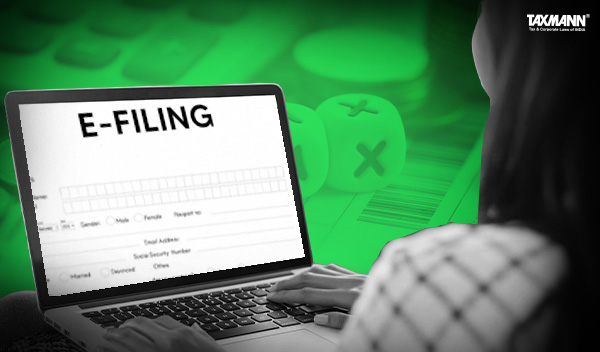CBDT Directed to Extend Due Date for e-Filing of ITR Due to Issues With New Utility Affecting Sec. 87A Rebate | HC
- Blog|News|Income Tax|
- 3 Min Read
- By Taxmann
- |
- Last Updated on 26 December, 2024

Case Details: Chamber of Tax Consultants vs. Director General of Income-tax - [2024] 169 taxmann.com 506 (Bombay)
Judiciary and Counsel Details
- Devendra Kumar Upadhyaya, CJ. & Amit Borkar, J.
-
Percy Pardiwala, Sr. Adv. & Dharan V. Gandhi for the Petitioner.
-
Akhileshwar Sharma & Abhishek R. Mishra for the Respondent.
Facts of the Case
The Income-tax Dept. annually releases utilities for filing income tax returns online. The department published a change in utility with effect from 5-7-2024. Said modification unilaterally disabled assessees from claiming rebate under section 87A. As a result, taxpayers, despite being statutorily eligible, were effectively deprived of their entitlements solely due to technical modifications introduced by the department.
The Chamber of Tax Consultants (petitioner) had filed the writ petition before the Bombay High Court seeking a direction to modify the system developed and put in place by the Tax Department for filing income-tax returns for the assessment year 2024-2025 to allow the assessees at large to take complete benefit of the rebate available under section 87A.
High Court Held
The Bombay High Court held that for considering a prima facie case, it is necessary to note that under the Income-tax Act, 1961, there is a concept of self-assessment wherein an assessee is required to compute his own income, determine his tax liability, and pay such tax, and then file a return declaring his income. However, due to the change in the utility with effect from 5-7-2024, the assessees at large could not compute rebate under section 87A under the new regime for income taxable at special rates.
As a result, the assessees may have to pay additional tax to the extent that the assessee cannot claim the rebate. The petitioner is entitled to file a revised return computing rebate under section 87A, enabling such an assessee to compute a refund in the revised return. Undisputedly, the last day to file a belated return in terms of section 139(4) is 31-12-2024, which allows even those assessees who have not filed their return within normal due dates.
The rebate under section 87A is inherently linked to the taxpayer’s total income and tax liability. The responsibility lies with the tax authorities to ensure proper implementation of the rebate as long as the taxpayer fulfils the statutory criteria. Procedural changes, such as those in utility software or instructions issued by the tax department, cannot override the substantive right to the rebate. Any action or inaction on the part of the tax authorities that limit the ability of taxpayers to avail of this statutory benefit is arbitrary and violative of the rule of law. Taxpayers should not bear the consequences of administrative inefficiencies or unilateral executive actions that undermine the legislative intent behind section 87A.
It is well-settled that statutory benefits must be extended in a manner that aligns with the legislature’s objectives. In this regard, procedural changes that deprive taxpayers of such benefits warrant judicial intervention to rectify the anomaly and ensure justice. Tax authorities must act as facilitators to help taxpayers comply with the law rather than creating impediments through technical or procedural hurdles. Ensuring fairness, equity, and transparency in tax administration is crucial for upholding public confidence in the system.
Based on the above discussion by way of interim relief, the Central Board of Direct Taxes was directed to forthwith issue requisite notification under section 119 extending the due date for e-filing of the income-tax returns to the assessees who are required to file a return of income by 31-12-2024, at least to 15-1-2025. This extension was to ensure that all taxpayers eligible for the rebate under section 87A can exercise their statutory rights without facing procedural impediments.
Disclaimer: The content/information published on the website is only for general information of the user and shall not be construed as legal advice. While the Taxmann has exercised reasonable efforts to ensure the veracity of information/content published, Taxmann shall be under no liability in any manner whatsoever for incorrect information, if any.

Taxmann Publications has a dedicated in-house Research & Editorial Team. This team consists of a team of Chartered Accountants, Company Secretaries, and Lawyers. This team works under the guidance and supervision of editor-in-chief Mr Rakesh Bhargava.
The Research and Editorial Team is responsible for developing reliable and accurate content for the readers. The team follows the six-sigma approach to achieve the benchmark of zero error in its publications and research platforms. The team ensures that the following publication guidelines are thoroughly followed while developing the content:
- The statutory material is obtained only from the authorized and reliable sources
- All the latest developments in the judicial and legislative fields are covered
- Prepare the analytical write-ups on current, controversial, and important issues to help the readers to understand the concept and its implications
- Every content published by Taxmann is complete, accurate and lucid
- All evidence-based statements are supported with proper reference to Section, Circular No., Notification No. or citations
- The golden rules of grammar, style and consistency are thoroughly followed
- Font and size that’s easy to read and remain consistent across all imprint and digital publications are applied



 CA | CS | CMA
CA | CS | CMA
